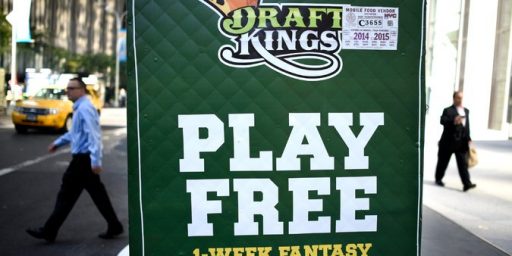Supreme Court Tosses Federal Law Barring Sports Betting
A big win for Federalism and common sense at the Supreme Court.

In a much-anticipated ruling, the Supreme Court, by a ruling of 6-3 that included all of the court’s conservatives plus Associate Justice Stephen Breyer, that the Federal law barring states from legalizing sports betting is unconstitutional, thus leaving it up to individual states to legalize what could prove to be the next big thing in the gambling industry:
The Supreme Court on Monday struck down a federal law that effectively banned commercial sports betting in most states, boosting the prospect of such gambling across the nation.
The case concerned New Jersey, but the court’s decision opened the door for other states that are eager to allow and tax sports gambling. Americans are estimated to annually place $150 billion in illegal wagers on sports, and many states seem interested in making such wagers legal and reaping tax revenues from them.
State officials and representatives of the casino industry greeted the ruling with something like glee.
“I am thrilled to see the Supreme Court finally side with New Jersey and strike down the arbitrary ban on sports betting imposed by Congress decades ago,” Philip D. Murphy, the state’s governor, said in a statement.
The American Gaming Association, a trade group that represents casinos, predicted that the ruling would generate revenue without endangering the integrity of sports competitions.
“Through smart, efficient regulation this new market will protect consumers, preserve the integrity of the games we love, empower law enforcement to fight illegal gambling, and generate new revenue for states, sporting bodies, broadcasters and many others,” the group said in a statement.
Others were warier.
“The court’s decision is monumental, with far-reaching implications for baseball players and the game we love,” Tony Clark, executive director of the Major League Baseball Players Association, said in a statement. “From complex intellectual property questions to the most basic issues of player safety, the realities of widespread sports betting must be addressed urgently and thoughtfully to avoid putting our sport’s integrity at risk as states proceed with legalization.”
As The New York Times explains in an accompanying report, this decision doesn’t mean that New Jersey residents will be able to bet on baseball games or the N.B.A. or N.H.L. playoffs beginning tonight. Instead, it will take some time for the plan that the Christie Administration had previously devised to be put into effect. As it stands, though, it appears that what we’re most likely to see will be sports gambling going forward at least some of the casinos in Atlantic City and at some of the horse racing tracks in the state. The most likely candidates for that last part appear to be the track located near the Jersey Shore in Monmouth County, and the track that has existed since the 1970s at the Meadowlands, which of course would place it close to both Met Life Stadium, the home of both the New York Giants and the New York Jets, and New York City. As for the status in other states, that will depend on how they respond to the ruling. Some states may choose to legalize sports betting outright, others may choose to legalize it on a more limited basis. Whatever the result, though, today’s decision means that Las Vegas will no longer be the only place in the country with legal sports betting.
Former Governor Chris Christie, who played a central role in the Garden State’s legal battle with the N.C.A.A. and other sports leagues, hailed the decision on Twitter as did the state’s new Governor Phil Murphy:
A great day for the rights of states and their people to make their own decisions. New Jersey citizens wanted sports gambling and the federal Gov’t had no right to tell them no. The Supreme Court agrees with us today. I am proud to have fought for the rights of the people of NJ.
— Governor Christie (@GovChristie) May 14, 2018
Today the Supreme Court sided with New Jersey in striking down the arbitrary federal ban on sports betting.
Today’s ruling will finally allow authorized New Jersey facilities to take the same bets that are legal in other states.
https://t.co/njbj9wdvpM— Governor Phil Murphy (@GovMurphy) May 14, 2018
This particular battle, which was primarily being waged between New Jersey and major sports organizations such as the N.C.A.A., N.F.L., and Major League Baseball has been going on for more than half a decade during which time it has made its way to the Supreme Court twice. The battle began back in 2012 when then New Jersey Governor Chris Christie signed into law a bill intended to give force to the results of a 2011 voter referendum that authorized sports betting at the Atlantic City casinos and select horse racing venues That law was challenged in Federal Court by a coalition of the major sports leagues along with the N.C.A.A. that argued that the state’s effort was not authorized by Federal law. A Federal District Court Judge ruled in favor of the leagues, and the Third Circuit Court of Appeals upheld that ruling. These rulings were based on the Professional And Amateur Sports Protection Act of 1992 (PASPA), a Federal law which bars states from “sanctioning” sports betting. The law, however, contained an exemption that provided that states which already had laws authorizing sports betting that had been in existence within a year of when the law went into effect could allow that betting to continue. At the time there were only four states — Nevada, Oregon, Delaware, and Montana — that were eligible for this exemption. Nevada, however, is the only state where there is active sports gambling. New Jersey appealed that Third Circuit decision to the Supreme Court, but the Justices declined to accept the appeal and let the Third Circuit’s ruling stand. It’s worth noting, though, that in its opinion suggested that a One noteworthy aspect of the Third Circuit’s decision was a suggestion that a state could make an end-run around the PASPA by repealing its law against sports betting as long as any sports betting operation in the state was not directly regulated by the state.
Relying on this admittedly non-binding suggestion in the Third Circuit’s opinion, New Jersey took a number of actions to attempt to establish legal sports betting in the state regardless of the existence of the PASPA. First, in October 2014 Governor Christie issued a directive stating that casinos and racetracks in New Jersey would not be prosecuted under state law for accepting sports bets. The directive also requested the Federal Judge who had initially ruled against the state allow the initiative to go forward. Simultaneously, the state legislature moved forward on the effort to repeal those provisions in New Jersey law that banned sports betting, a bill which Governor Christie quickly signed into law. Before that repeal could take effect, though, the same sports leagues that had challenged the initial New Jersey law filed a new Complaint in Federal Court and obtained a stay that halted betting pending a ruling. In their lawsuit, the leagues argued that the state’s repeal of its laws against sports betting was merely a fig leaf meant to accomplish the same thing that the initial law did. In the end, the Federal District Court Judge agreed with the sports leagues, and his decision was upheld by the Third Circuit notwithstanding what it had said in its previous ruling. The Supreme Court agreed to accept that case for review last year and heard oral argument in the case in December, at which time it appeared that a clear majority of the Court was skeptical of the arguments in favor of the PSAPA was constitutional.
As I’ve said before, I’ve always thought that New Jersey had the better case here
Much like the arguments against legalizing marijuana, there really isn’t any argument against sports gambling that doesn’t boil down to the fact that some people don’t like the choices that other people make and try to use the power of the state to prevent them from making them. Prohibition and the War On Drugs, however, have shown us that making something people want to do illegal just forces it underground. The practice is already legal in Nevada, where there is an active business, and three other states, it’s legal overseas where it it common for people to place bets on American sporting events, and, of course, it occurs in the less than legal venues of person-to-person wagering and operations run by organized crime. Given all of that, there really doesn’t seem to be any reason why it should not be permissible for government to allow sports gaming to be a legal business that takes place out in the open rather than something that takes place in back rooms run by criminals. Ideally, Congress and the states should get out of the way and let the marketplace decide if there really is a big market for sports gaming in the United States. The political influence of the major sports leagues makes it unlikely this will happen in the short term, of course, which is why the course New Jersey has taken these last several years through the court system necessary. I for one hope they succeed.
Additionally, there is a strong argument that the PASPA itself is unconstitutional because it is not authorized by the Commerce Clause and conflicts with an individual state’s rights to establish its own laws on an issue such as this under the Tenth Amendment. In its ruling today, the Court has largely adopted that position, and it could have implications far beyond the issue of sports betting. Indeed, it is largely on this basis that the Court basis its opinion today, making reference to a specific doctrine known as the “anti-commandeering” doctrine that has been derived from the Tenth Amendment. In its essence, this doctrine stands for the proposition that, except under a limited set of circumstances, the Federal Government cannot force states to take specific action or punish them for not taking action such as enforcing Federal laws that are outside their jurisdiction, as I explained in a recent post dealing with a Federal Court ruling on the Trump Administration’s effort to punish so-called “sanctuary cities” that decline to turn suspected undocumented immigrants over to Federal authorities:
The line of relevand cases begins with South Dakota v. Dole, a case in which South Dakota and other states challenged a Federal law that withheld a portion of Federal highway funds from states that declined to raise their drinking age to 21. The states argued that the statute was invalid because it interfered with powers reserved for the states by the Tenth Amendment. The Court ruled in favor of the Federal Government but also set forth a series of criteria that the Federal Government must meet in order to avoid violating the Tenth Amendment and other protections of the rights and powers of the states when using this method to force action by the states.
Some five years after Dole was decided, the Court handed down its decision in New York v. United States. That case dealt with a Federal law governing the disposal of low levels of radioactive waste. One of the provisions of that law required states to “take title” to such waste and made them primarily responsible for its disposal. The Court found that provision of the law to be unconstitutional because it attempted to compel the states to participate in a federal regulatory program, which Justice O’Connor ruled “crossed the line distinguishing encouragement from coercion.” Specifically, O’Connor found that the “take title” provision was impermissible because it forced to choose between complying with Federal regulations and taking title to the waste. Given that Congress lacked the authority to compel the states to do either of these things, it similarly lacked the authority to compel them to choose between them due to the “core of state sovereignty” recognized by the Tenth Amendment.
Finally, some five years after New York and ten years after Dole, the Court handed down a ruling in Printz v. United States that has stood for twenty years as the definitive ruling on the extent to which Federal law can be used to compel states to act. Printz dealt with provisions of the Brady Handgun Violence Prevention Act, the so-called “Brady Bill.” One part of that bill required state and local law enforcement to conduct background checks for all gun purchases within their borders for an interim period until a Federal database that would conduct those checks on a more-or-less instant basis could be built, tested, and put into operation. The Supreme Court struck that provision down as unconstitutional under the Tenth Amendment in a decision written by Justice Scalia that relied heavily on both the criteria set forth in Dole which the Federal Government must meet to compel states to act and the holding in New York that more fully developed the limits on the Federal Government’s ability to force the states to act.
There is, of course, one other decision relevant to this issue, and it is of relatively recent vintage. That case is National Federation of Independent Business v. Sebelius, the 2011 case in which the Supreme Court largely upheld the Constitutional arguments against the Affordable Care Act. In one part of that decision, though, the Court struck down one provision of the PPACA that purported to use Federal power to force the states to expand Medicaid by threatening to withhold all of a state’s Medicaid funding if it declined to expand coverage as permitted under the PPACA. While there was not a solid majority supporting the reasoning for a decision in that part of the case, there was a majority in agreement with the result that the requirement that states expand the program or risk losing hundreds of millions of dollars or more in Medicaid funding was not permissible under either Article I or the Tenth Amendment.
It was in the spirit and the letter of these cases that the Justices ruled today that Congress took the step it did today, which appears to advance the doctrine further down the road in ways that could have broad implications for other types of cases. This includes areas such where individual states and localities have moved forward in policy areas in ways that have veered away from what is considered permissible under Federal law. This includes not just sanctuary cities, where today’s ruling is likely to have a big impact on the status of the outstanding cases challenging the Trump Administration’s efforts to punish those localities, but also those states that have legalized marijuana, decriminalized it, or legalized it for medical purposes. What this decision seems to suggest is that efforts by the Federal Government to undermine these local and state decisions will face a dificult day in Court and could very well end up getting shut down. In any case, in the short term this is, as Ilya Shapiro puts it at the Cato Institute’s blog, a big win for Federalism, and a big win for common sense.
Here’s the opinion:
Murphy v. NCAA Opinion by Doug Mataconis on Scribd



I expect several states will take advantage of this opportunity and institute some form of legal sports betting, perhaps as part of their state lottery.
After all, people are notoriously stupid when it comes to gambling, and sports bets are not particularly easy to grasp, particularly proposition bets (or prop bets), dealing with events other than the result of the game (ie will there be a safety, who’ll be ahead in the first quarter, who’ll score first, how many touchdowns will be made, etc.)
I’m sure we’ll hear a lot about gambling addiction, too. That’s a real concern, but consider that casinos, racetracks and particularly lotteries are already widespread. Not to mention rather easy availability of off-shore online casinos, which offer sports betting.
As Doug mentioned, it will be very interesting to see how this decision affects future legal cases involving marijuana…if it is up to states as to whether or not they approve of sports betting, why should they also not be the ones to decide whether or not to approve of pot…
Smart, efficient regulation will make pretty much anything good. It’s not, however, the kind of regulation that usually emerges from the legislative/lobbying process.
Months ago I read somewhere that MLB was backing this and wants to have wagering kiosks in the ballparks.
@Kathy:..After all, people are notoriously stupid when it comes to gambling,..
I spend maybe $25 or $30 on lotto tickets over a few weeks time.
I would never drop $25 or $30 on one ticket.
That would be dumb…
A victory for Pete Rose!
In any case, this ruling doesn’t affect me in the slightest. I’ve probably made two or three sports bets in my entire life. Maybe spent upwards of $10 on the lotto. I guess it’s not really my thing.
I guess my only concern is the possibility of more players throwing games for money?
Anybody besides me think that allowing betting on NCAA events is a bad idea?
The idea that you’d be allowed to bet on amateurs playing college sports seems like a not-very-good idea.
But maybe it’s just me.